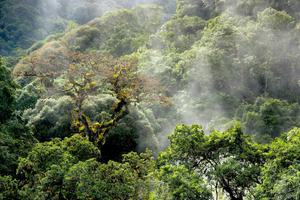An excavator tears up trees in the Kebar Mountains to expand the Trans-Papua Highway. Daniel Beltrá/Greenpeace
A slate of new mega-projects in development around the world — including roads, waterways, railways, and dams — will open up vast tracts of land to natural resource extraction and deforestation, derailing government and private sector pledges to curb forest loss, according to a new report.
Five Amazon countries, for example, plan to spend $27 billion over the next five years to build or update 7,500 miles of road that could result in the deforestation of 5.9 million acres. In Indonesia, the 2,500-mile Trans-Papua Highway will cut through Lorentz National Park, increasing access to 123,000 acres of mining concessions within the park. And in Sub-Saharan Africa, proposed infrastructure to connect natural resource extraction projects with international markets would cut across 400 protected areas and degrade another 1,800 areas.
The data is part of a progress report from members of the New York Declaration on Forests (NYDF), a non-binding agreement adopted by nations, corporations, and other groups to halve deforestation by 2020 — a goal that will not be met, the report found. Another pledge of ending deforestation entirely by 2030 will require “an unprecedented reduction” in forest loss, Reuters reported.
The progress report finds that road networks have increased by over 40 percent since the early 2000s in key tropical forest areas, including Indonesian Papua and the Congo Basin. And more than 15 million miles of new roads are expected to be built over the next three decades, 90 percent of which will be located in developing countries.
“Big new projects underway or planned in the Amazon, Indonesia, Mesoamerica, the Congo Basin and beyond reveal that our insatiable appetite for coal, minerals, metals, energy and agricultural commodities like soy has opened up a new front in the battle to protect the world’s forests,” Franziska Haupt, Berlin executive director of Climate Focus and lead author of the new report by the NYDF, said in a statement. “Some governments are compounding this threat and rolling back forest protections, as countries struggle to cope with the economic fallout of Covid-19.”



